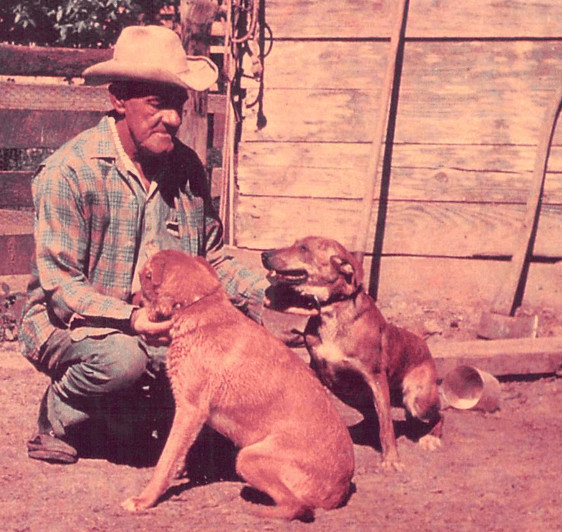
From the upcoming e-book, A Pineywoods Manifesto: Field Notes on the Full Life by Curt Iles.
“Whatever your hand finds to do, do it with all your might.”
-Solomon in Ecclesiastes 9:10
An Honest Day’s Pay for an Honest Day’s Work
In the Louisiana Pineywoods, we believe in working. Many of my friends work in various aspects of the timber industry. Whether it’s “working in the woods”. i.e. cutting, loading pulpwood, hauling it to the mills, or actually working the D shift at the mill or refinery, helping Fort Polk keep our military ready, or working in the white-collar world in the classroom or office, we believe in working.
Charlie Daniels said it well, “I ain’t askin’ nobody for nothin’ if I can’t get it on my own.”
It’s not good English, and we should realize that it’s all right during a hard season to ask for help, but we try to carry our own load.
In return, we expect to be treated fairly, safely, and receive fair pay in return for the sweat of our brow.
As usual, I have a story on this. I haven’t quite figured out where to put the couple in my story in the hard work buckets of hard work, handouts, hands up, and slick cons.
For the first time in my life, I live in a city. It’s called Alexandria, Louisiana. It’s not large compared to most, but coming from the village of Dry Creek, it’s a true city. It’s a trade off living here: proximity to WalMart, Academy, and Logan’s versus missing the rural night sky, call of the owl and whippoorwill.
Living within a mile of seven grandchildren is the ace in the hole of why DeDe and I moved here. We believe it’s a good tradeoff. We seldom miss a dance recital or soccer match.
As a writer, I seek inspiration in the strangest places. Last week, I sought it on a late evening city bus ride. I paid my 75 cents and got on the Air Park Bus loop just as a storm was breaking. Everyone should ride a city bus sometimes. It gives one the chance to see a city as it is. Both the good and the bad. The dozens of small Baptist churches with long names such as First Old Missionary Union C.M.E. Baptist Church.
Then there are the housing projects. That’s where most bus riders board or unboard. Some projects are neat, while others are boarded up and would be scary places after dark. The folks riding the buses are working class. They’re returning from the hotels and restaurants where they work in various service industries, hopefully receiving an honest day’s labor for their work.
As the city bus neared the intersection of I-49 and Air Base Road, I perked up. I wondered if my couple would be there at their intersection between Burger King and McDonald’s. As I travel to and from my job at Roy O. Martin’s Chopin Mill, I often stop in at McDonald’s to complete my paperwork and enjoy a cupy of senior coffee.
This couple sat daily at the corner, holding their homeless sign. Each one wears a backpack and the woman sits on a milk crate. Around their spot are scattered other signs of homelessness: WalMart bags stuffed with clothes, an old umbrella, and a jacket or raincoat.
They’ve got a prime spot. There are few stops along I-49 between Lafayette and Shreveport. The lure of fast food, clean restrooms, gas, and Cracker Barrel beckon the weary travelers who’ve driven 75 mph along the most beautiful stretch of interstate in America. (Few billboards and a cross-section of the diversity of our state.)
The homeless couple looks … well, homeless. They are thin and thinly dressed on this cool late afternoon. It’s caught my attention that they are at this spot most days, so my belief in their “homelessness” is suspect. I always wave at them but have never contributed to their pot.
The city bus stops in the driveway and its air brakes whoosh as the door opens and my homeless couple board, dropping their coins in the toll slot, speaking to the driver by name. Their signs are neatly folded and the milk crate crammed with their wares.
I stifle a laugh. It’s as if two businessmen are boarding the Metro with their briefcases after a full day of trading hedge funds.
We travel a few miles down Louisiana 1 and they un-board at a ratty trailer park that looks one slippery step above homelessness. I study them through the rain-swept window as they hurry across the highway. Their hollow cheeks, toothlessness, and emaciated bodies clearly ring out: crystal meth. I know what it does to a person’s body, their appearance, and pocketbook.
I’m not sure what they make during their long days at the Air Park exit off Interstate 49. I’d probably be surprised. I also know where that begging money’s going: down the dark hole of meth addiction. There’ll never be enough money nor enough meth.
As I prepare to write this chapter on the value of an honest day’s pay for an honest day’s work, I’m not sure what box to pigeonhole our homeless couple in. They’re not being honest. They’re not homeless, although they probably have been, and will be again.
They’re not stealing as in breaking into homes and sneaking into yards like the sorry rascals who stole my bicycles three cans of gas. I know by day’s end, my possessions were sold on the street to buy their drug.
But my couple is making a living by deception and that is theft. Then again, they’re working hard. They’re out there daily, in the hot August sun or biting north winter wind, plying their trade.
I mentally compare them to the men and women who always arrive an hour early for their shift at the Mill. I asked one about it and he said, “I like to get here early, allow for car trouble, get settled in, and then do my twelve hours of honest work.”
An honest days’ work for an honest day’s pay.
It’s the Pineywoods way.
It reminds me of the words of a song (as most things do). “Working Man’s Blues” by Merle Haggard,
“I ain’t never been on welfare,
And that’s one place I’ll never be.
I’ll keep on working.”
An honest day’s work for an honest day’s pay.
It’s the American way.
Find what you love to do, and then do it with all of your hands and heart.
It’s the Pineywoods way.

 Creekbank Stories Curt Iles, Storyteller
Creekbank Stories Curt Iles, Storyteller
